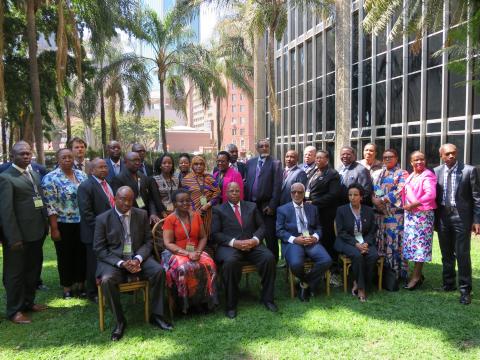
Harare, Zimbabwe, 17/08/2016
Members of the African Parliamentarians’ Network on Development Evaluation (APNODE) have stressed the need for consolidation and expansion of the Network at the 2ndAnnual General Meeting (AGM) held in Harare, Zimbabwe, on August 15 and 16, 2016. Sixty-two participants from 16 countries took part in the meeting, with APNODE welcoming participants from Benin, Lesotho, Madagascar, Namibia and Sudan for the first time.
Opening the meeting, the Speaker of the National Assembly of Zimbabwe, Jacob F. Mudenda, stressed that development evaluation should inform appropriate policies and legislation to address two major issues, namely how Africa can exploit its abundant natural resources to promote development on the continent; and how it can reduce capital flight. He saw an important role for APNODE in promoting the use of development evaluation: “APNODE should spread its wings throughout all the parliaments of Africa, and move forward with conviction,” he said.
Discussing the objective of expanding the APNODE network, participants called for the creation of an APNODE chapter in each African country to enable a stronger focus on development evaluation. Members of Parliament, parliaments and evaluation institutions in Africa, would benefit from the tools, capacity and support of the network to engage in evaluation processes.
The second AGM highlighted the importance of evaluation in development processes at local, national and regional levels. “Parliamentarians make important decisions and it is important that they have reliable data derived from evaluations,” the Vice-Chairperson of APNODE, Susan Musyoka of Kenya, stressed. The AGM underlined that individual parliamentarians, as well as parliaments as institutions, have a key role to play in the evaluation process.
APNODE encourages the use of scientific approaches of evidence-based decisions making in all parliamentary work and reiterated the global evaluation network on the “10 reasons for parliamentarians to engage in national evaluation processes.”
Participants also reviewed the Annual Report 2015-2016 and provided guidance on the draft Strategic Plan for the Network, which is currently being drafted. Recommendations were made to the Executive Committee on ways of ensuring the sustainability of the network. The AGM 2016 was concluded by the offer of Sudan to host the next AGM in 2017 in Khartoum, Sudan.
IDEV, the Independent Development Evaluation of the African Development Bank, currently hosts the APNODE Secretariat. Other development partners, including the Centre for Learning on Evaluation and Results (CLEAR) Anglophone Africa, UNICEF and UN Women, also took part in the meeting.
Parliamentarians for Evaluation - Hon. Evelyn Mpagi-Kaabule speaks on the importance of evaluation for parliamentarians in carrying out their responsibilities.

